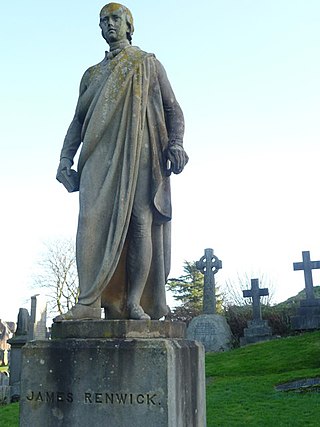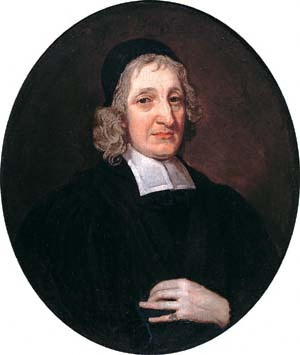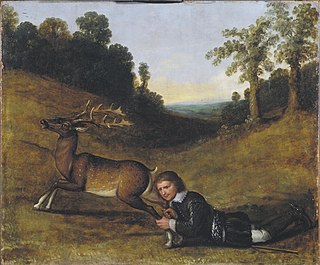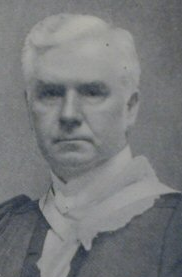Related Research Articles

Robert Leighton was a Scottish prelate and scholar, best known as a church minister, Bishop of Dunblane, Archbishop of Glasgow, and Principal of the University of Edinburgh from 1653 to 1662. He was "noted for his Christian piety, his humility and gentleness, and his devotion to his calling".

James Renwick was a Scottish minister who was the last of the Covenanter martyrs to be executed before the Glorious Revolution.

Robert Blair was a Scottish presbyterian minister who became a Westminster Divine and Moderator of the General Assembly of the Church of Scotland in 1646, after failing to emigrate to Boston in 1636.
John Paterson may refer to:
Bishop Alexander Burnet was a Scottish clergyman.
Arthur Rose was a Scottish minister, Archbishop of St Andrews, and, informally, the first Episcopal Primate of Scotland, after the fall of the Restoration Episcopate in 1689.
Alexander Rose (1647–1720) was a Scottish scholar, minister and bishop. He was a Church of Scotland minister before becoming Professor of Divinity at the University of Glasgow and Principal of St Mary's College, St Andrews. He rose to become Bishop of Moray and then Bishop of Edinburgh. His failure to convince King William III and II that the Scottish bishops could be trusted led to the abolition of Episcopacy in Scotland. Rose continued as a nonjuring bishop, eventually becoming leader of the informal and embryonic Scottish Episcopal Church.
James Ramsay (c.1624–1696), bishop of Dunblane, bishop of Ross, was son of Robert Ramsay (1598?–1651). The latter was successively minister of Dundonald (1625–40), of Blackfriars or College Church, Glasgow (1640–7), and of the High Church, Glasgow (1647–51); was dean of the faculty of the University of Glasgow 1646 and 1650–1, rector in 1648, and principal from 28 August 1651 until his death in the following September. He is buried in Canongate Churchyard. His grave is officially "lost" but the ornate, illegible stone on the east side of the church, now somewhat spuriously ascribed to Rizzio is probably his.

John Paterson (1632–1708) was the last archbishop of Glasgow in the Church of Scotland. He was the youngest son of John Paterson, bishop of Ross. John, after some preliminary studies at Marischal College, University of Aberdeen, was admitted as a student of theology at the University of St Andrews on 13 March 1655, and he is entered as regent in St Leonard's College under date of 3 February 1658, indicating that he had taught the junior class in the preceding year.
John Paterson (1604–1679) was the Bishop of Ross in Scotland.
John Paterson (1776–1855) was a Scottish missionary in Scandinavia and the Russian Empire. He earned his doctorate from the University of Abo and was instrumental in the operation of the Russian Bible Society for several years eventually being pensioned by Czar Nicholas I. He returned to Edinburgh, where he served as secretary for Scotland of the London Missionary Society.
John Fullarton, of Greenhall, Argyll, was a Scottish clergyman and nonjurant Episcopal Bishop of Edinburgh between 1720 and 1727.

David Dickson (1583–1663) was a Church of Scotland minister and theologian.

Alexander Shields or Sheilds or Sheills was a Scottish, Presbyterian, nonconformist minister, activist, and author. He was imprisoned in London, in Edinburgh and on the Bass Rock for holding private worship services. After his escape from prison he wrote A Hind Let Loose which amongst other things argues for the rights of people to resist tyrants including the bearing of arms and the resistance of taxes. It even argues that assassination, in extreme cases, is sometimes justified. Shields was one of the ministers who supported the Cameronians who disowned the king. They were brutally put down. All three of the Cameronian field-preachers, of which Shields was one, rejoined the church after the Revolution. Shields served as a chaplain to King William's armies in the Low Countries. Shields was later called to be a minister at St Andrews but did not stay there long as he joined the second Darien Expedition. After its failure he died on Jamaica under 40 years of age.
Events from the year 1777 in Scotland.
John M. K. Paterson was a Scottish minister. He served as Moderator of the General Assembly of the Church of Scotland in 1984.

Walter Ross Taylor (1838–1907) was a Scottish minister of the Free Church of Scotland who served as Moderator of the General Assembly in the critical year of Union in 1900. From 1900 he led the United Free Church of Scotland with its Moderator Rev Robert Rainy.

Rev Thomas Hog of Kiltearn (1628–1692) was a controversial 17th century Scottish minister.

Alexander Dunbar was a Covenanting field preacher and school teacher. He was imprisoned on the Bass Rock for about a year between 1685 and 1686.
Thomas Ross of Nether Pitkerrie, was born about 1614. He was the son of George Ross of Nether Pitkerrie. He continued in Kincardine after the establishment of prelacy and owes his leaving to a meeting with John M'Gilligan.
References
- ↑ Fasti Ecclesiae Scoticanae; by Hew Scott
- Keith, Robert, An Historical Catalogue of the Scottish Bishops: Down to the Year 1688, (London, 1824)